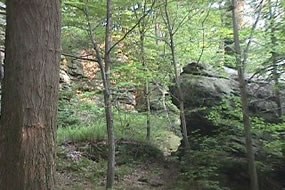"The volley fired by a young Virginian in the backwoods of America set the world on fire." attributed to Horace Walpole
Article
Jumonville Glen
By late May of 1754, Washington had reached a large natural clearing known as the Great Meadows. He made this his base camp. Grass there could provide food for his animals, and water was readily available.
Soon after he arrived, he received word that a party of French soldiers was camped in a ravine not far from his position. On the stormy night of May 27th, 1754, Washington and about 40 men began an all night march to confront the French and learn their intentions. They traveled through woods so dark the men sometimes spent nearly half an hour just trying to find the trail.

NPS photo by M.J. McFadden
The Skirmish
About dawn, Washington met with a friendly Seneca chief, the Half King, and made plans to contact the French Camp. As the French commander had not posted sentries, Washington and his men easily surrounded the unsuspecting French.
A shot was fired, no one really knows by whom, and soon the peaceful glen was filled with the crash of musketry and the sulfurous smell of powder. The skirmish lasted about 15 minutes. When it was over, 17 Frenchmen were dead or wounded and 21 captured. One escaped and made his way back to Fort Duquesne at the forks of the Ohio. Washington's casualties were one man killed and two or three wounded.
"I fortunately escaped without any wound, for the right wing, where I stood, was exposed to and received all the enemy's fire, and it was the part where the man was killed, and the rest wounded. I heard the bullets whistle, and, believe me there is something charming in the sound."
Diplomats or Spies?
Controversy surrounds the events that took place at Jumonville Glen, named after Ensign Joseph Coulon de Jumonville. He was the leader of the French detachment, and was killed there.
Soon after the smoke had cleared, French survivors claimed they had been attacked without cause by Washington. They claimed they were on the same sort of mission Washington himself had been on the winter before. That explained, they said, why they had been so easily surprised and why they had not posted sentries. Washington asked why, if the French were on a diplomatic mission, they were hidden in a ravine, off the trail, and in the area for perhaps a couple of days without approaching him.
Washington sent his prisoners to Williamsburg while he returned to the Great Meadows.
Part of a series of articles titled French and Indian War - The Contest for the Ohio River Valley .
Previous: Prelude to war in North America
Next: Battle of Fort Necessity
Last updated: December 11, 2025
